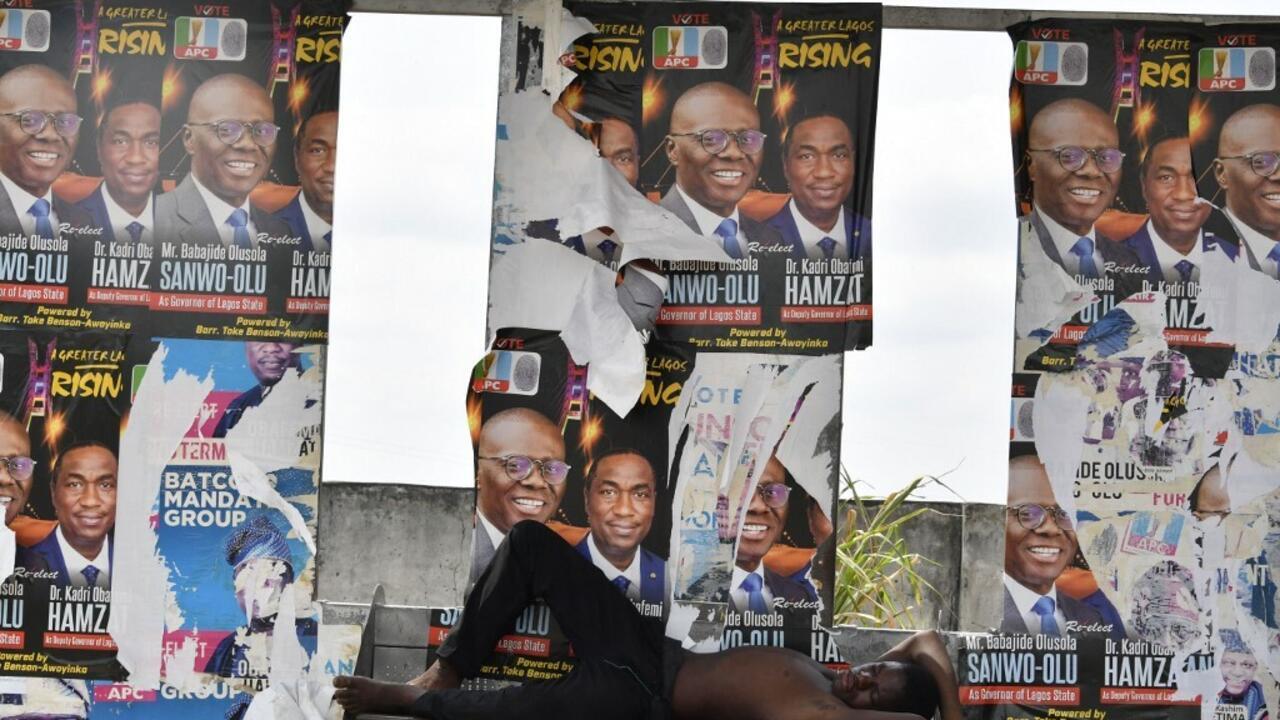Nigeria: the stakes of the gubernatorial election, a decisive election
Posters of the campaign for the governorship election in Lagos, Nigeria, March 7, 2023. AFP - PIUS UTOMI EKPEI
Text by: RFI Follow
3 min
After the presidential election on February 25, won by the candidate of power Bola Tinubu, Nigerians elect this Saturday governors and representatives of local assemblies in 28 federated states out of 36. This is a crucial election in the Nigerian federal system, one of the major issues at stake today rests on the opposition's ability to confirm its presidential scores.
Advertising
Read more
The electoral map was completely redrawn following the general elections in Nigeria on 25 February. Faced with the ruling All Progressives Congress, the opposition has grown, recalls Cyrielle Maingraud, deputy director of the French Institute of African Studies in Ibadan.
« The emergence of Peter Obi's Third Way of the Labour Party completely shattered the opposition that had been seen since 1999 between the APC and the PDP. The question I also ask myself is to what extent the presidential vote will result in the same vote in the gubernatorial elections. »
The opposition notably came out ahead in Lagos – which voted overwhelmingly for Peter Obi of the Labour Party – but also in Kano – where Rabiu Kwankaso of the new Nigerian People's Party came out ahead by a wide margin. In contrast, in the southeast, the governor of Rivers State betrayed his own party's candidate, Atiku Abubakar – pushing votes for Bola Tinubu in the presidential election.
► Read also: Nigeria: the election of the governor of Lagos, crucial political issue and source of tension
But it is unlikely that the APC will benefit from this maneuver again. "Governors are also people who have political and economic networks. They have machinery that will be put in place at the state level, machinery that they did not set in motion in the same way for the presidential election. »
The gubernatorial election will be a crucial test for the president-elect – and an unmissable opportunity for the opposition, especially since in the Nigerian federal system, local politicians hold very important political and symbolic power.
Governors, powerful and influential politicians
In every Nigerian regional capital, "Government House" - the governor's palace - is a central and ultra-secure point. It is not uncommon to see the imposing escort of the local governor come out, tinted windows and sirens blaring. These powerful local politicians reign supreme over regions as vast and populous as some African nations – and possess enormous financial resources.
And if the President of the Federal Republic of Nigeria has control over the security apparatus, the governors have almost immediate power of action over their citizens. During the presidential election on 25th February the Labour Party candidate Peter Obi, for example, highlighted his record as head of the state of Anambra where he notably reformed the education system.
Nigerian governors play a key role in appointments, both locally and nationally – their support is even essential to becoming a traditional leader or president of Nigeria. During the presidential election, Atiku Abubakar of the People's Democratic Party (PDP) was betrayed by five governors of his party, who arranged for him not to come out ahead in their regions after this election.
Newsletter Receive all the international news directly in your mailbox
I subscribe
Follow all the international news by downloading the RFI application
Read on on the same topics:
- Nigeria
- Elections in Nigeria

